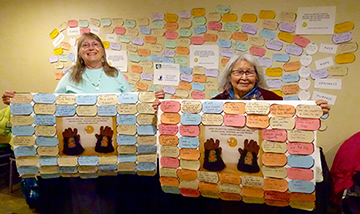Suicide Interventions: A Tribal & University Partnership between the Tanana Chief's Conference & the Alaska Training Cooperative (AK UCEDD)
September 19, 2016

|
| Alaska Training Cooperative (AKTC) trainers Sarah McConnell (left) and Elizabeth "Kaviaq" Nictune Fleagle (Inupiat) at local health fair table with, "I Will..." words of people to prevent suicide. |
The Alaska Training Cooperative (AKTC) is part of the Alaska UCEDD Center for Human Development at the University of Alaska Anchorage. The AKTC is a statewide effort to develop coordinated and accessible opportunities for professionals working with Alaska Mental Health Trust Authority beneficiaries. Beneficiaries include people with: mental illness; developmental disabilities; chronic alcoholism and other substance related disorders; Alzheimer's disease and related dementia; and traumatic brain injuries. The AKTC is dedicated to collaborating with Alaskan communities to train rural behavioral health care providers by blending traditional wisdom with evidence-based practices.
Between 2013-2016, AKTC has worked in partnership with Tanana Chief's Conference (TCC) on suicide prevention and intervention efforts in Alaska's interior villages, and in the state's second largest city of Fairbanks. A key strategy is training with Tanana Chief's Conference staff, health aides, and village public safety officers using the evidenced-based curriculum, "Question, Persuade, and Refer". In turn, trainees go on to teach other community members, adjusting the tools to fit particular cultures. Together, the Tanana Chief's Conference and the AKTC have worked to modify the teaching materials and delivery methods for Alaska Native audiences. Here are two modification examples:
Example 1: We learned to move away from the sometimes inaccessible standards of "program fidelity", by making certain curriculum sections optional. In this way, community trainers could choose which slides best fit their social, cultural, and geographic settings.
Example 2: Two communities added a slide specifically devoted to the use of alcohol as a risk factor for suicide in the "bush" (rural Alaska).
The Alaska Training Cooperative worked with the curriculum developer in making these recommended changes. After modifications, AKTC staff would travel out to villages with an Elder, to offer support while local community trainers delivered the courses. Visits to participating villages happened only as the result of an invitation from particular communities.
Resources:
- "Question, Persuade, and Refer" training: https://www.qprinstitute.com
- Alaska UCEDD: Center for Human Development, https://www.uaa.alaska.edu/academics/college-of-health/departments/center-for-human-development/
- Alaska Training Cooperative, https://aktclms.org/
Funders: State of Alaska Department of Behavioral Health; Alaska Mental Health Trust Authority







